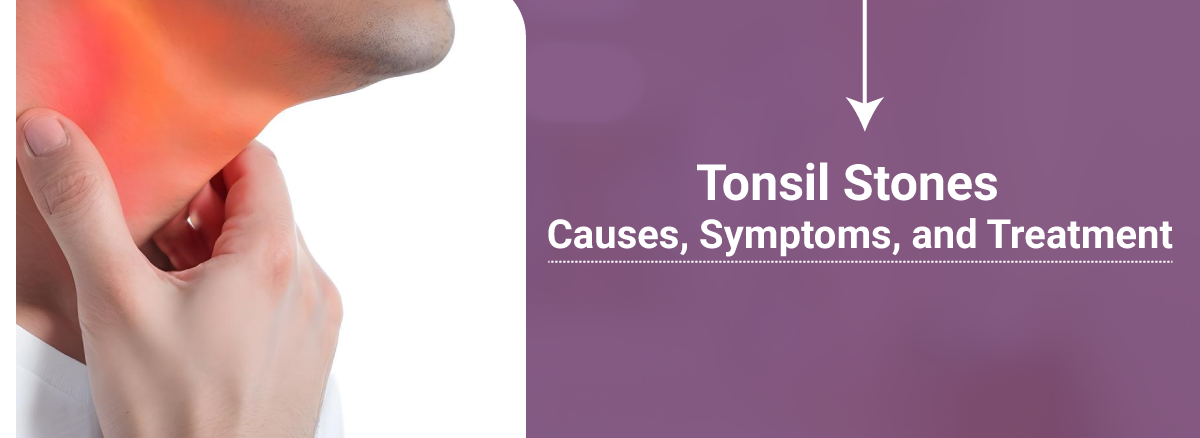Tonsil stones, also known as tonsilloliths, are small, hard deposits that form in the gaps of your tonsils. They can be a source of discomfort and bad breath, but understanding their causes, symptoms, and treatment can help manage them effectively. In this blog, we’ll cover everything you need to know about tonsil stones.
What Are Tonsil Stones?
Tonsil stones are calcified masses that develop in the tonsils. The tonsils are two small glands located at the back of your throat, and they help fight infections. They have tiny crevices called crypts where bacteria, dead cells, and other debris can get trapped and harden over time, forming stones.
Causes of Tonsil Stones
- Bacterial Growth: One of the main causes of tonsil stones is the accumulation of bacteria in the tonsil crypts. These bacteria feed on food particles and dead cells, leading to the formation of stones.
- Food Particles: Small bits of food can get trapped in the tonsil crypts. Over time, these particles can combine with bacteria and dead cells to form stones.
- Dead Cells: Our mouth sheds dead cells regularly, and these cells can get trapped in the tonsil crypts. When mixed with bacteria and food particles, they can harden into stones.
- Post-Nasal Drip: Excess mucus from post-nasal drip can contribute to tonsil stones. The mucus contains bacteria and particles that can become trapped in the tonsil crypts.
- Chronic Tonsillitis: People with chronic tonsillitis are more prone to developing tonsil stones. Inflammation and infection in the tonsils can lead to the formation of these stones.
Symptoms of Tonsil Stones
Tonsil stones can vary in size and may not always cause noticeable symptoms. However, common signs and symptoms include:
- Bad Breath: One of the most noticeable symptoms is persistent bad breath. The bacteria and decaying matter in the stones can produce an unpleasant odor.
- Sore Throat: Tonsil stones can cause discomfort and a sore throat, especially if they become large or cause irritation.
- Difficulty Swallowing: Large tonsil stones can make swallowing painful or difficult. You might feel a lump in your throat or a sensation of something stuck.
- Ear Pain: The nerves in the throat and ears are connected, so pain or discomfort from tonsil stones can sometimes be felt in the ears.
- White or Yellow Debris: If you look at your tonsils, you might see white or yellowish spots, which are the stones themselves.
- Swollen Tonsils: In some cases, tonsil stones can cause the tonsils to become swollen and inflamed.
Diagnosis of Tonsil Stones
A healthcare provider can diagnose tonsil stones through a physical examination of the throat. They may use a light to examine the tonsils and look for any stones or inflammation. In some cases, imaging tests such as X-rays or CT scans may be used to locate larger or deeper stones.
Treatment Options
Treatment for tonsil stones depends on their size and the severity of symptoms. Here are some common approaches:
- Home Remedies:
- Saltwater Gargle: Gargling with warm salt water can help dislodge small stones and reduce inflammation.
- Hydration: Drinking plenty of water helps keep your mouth moist and can flush out particles that may contribute to stone formation.
- Good Oral Hygiene: Brushing and flossing regularly can help remove bacteria and food particles that may lead to tonsil stones.
- Manual Removal: For larger stones, you might be able to gently dislodge them using a cotton swab or your finger. However, this should be done with caution to avoid damaging the tonsils.
- Medical Treatments:
- Laser Tonsil Cryptolysis: This procedure uses a laser to remove the tonsil crypts where stones form, reducing the likelihood of future stones.
- Tonsillectomy: In severe cases or if tonsil stones are a recurring problem, a tonsillectomy (surgical removal of the tonsils) may be recommended. This is usually seen as a final option.
- Medications: If tonsil stones are causing significant discomfort or infection, your doctor may prescribe antibiotics or other medications to address the issue.
Preventing Tonsil Stones
While it’s not always possible to prevent tonsil stones, there are steps you can take to reduce the risk:
- Maintain Good Oral Hygiene: Regular brushing, flossing, and using mouthwash can help reduce bacteria and food particles in your mouth.
- Stay Hydrated: Drinking plenty of water helps keep your mouth clean and can prevent particles from getting trapped in the tonsil crypts.
- Avoid Smoking: Smoking can irritate the tonsils and increase the risk of developing tonsil stones.
- Monitor for Chronic Tonsillitis: If you have chronic tonsillitis, work with your healthcare provider to manage the condition and reduce the risk of stones.
When to See a Doctor
If you experience persistent symptoms like severe sore throat, difficulty swallowing, or persistent bad breath, it’s important to consult a healthcare provider. For specialized care, you can contact Dr Simple Bhadania, an ENT Specialist in Ahmedabad. They can provide a proper diagnosis and recommend appropriate treatment options.
In conclusion, tonsil stones are a common issue that can be managed with good oral hygiene and proper treatment. Don’t hesitate to seek medical advice if you’re experiencing symptoms or have concerns about tonsil stones. Taking proactive steps can help keep your tonsils healthy and prevent the formation of these bothersome stones.


